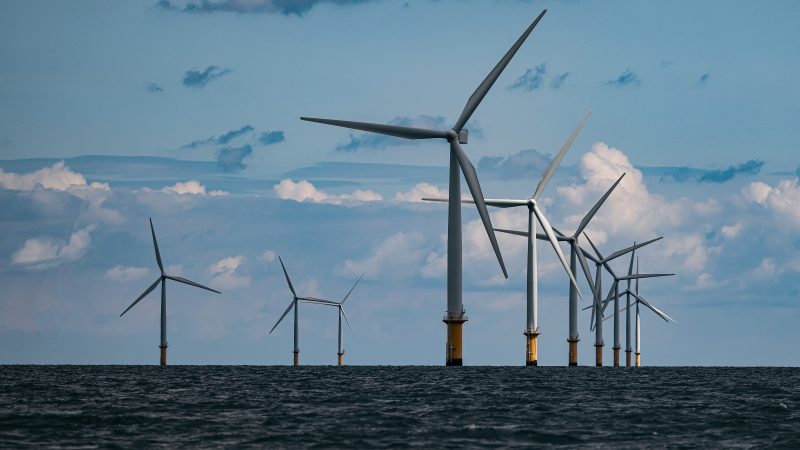
At the centre of Labour’s manifesto today was a commitment to create GB Energy: a new publicly owned energy company, capitalised with £8.3bn funded by a windfall tax on the record profits of the oil and gas giants, investing in and scaling homegrown clean power. Its centrality is not surprising.
The policy is hugely popular and has been a consistent theme of Labour’s campaign, presented as the route to energy security, lower bills, and rapid decarbonisation.
But what exactly are its benefits, and what more is required to ensure GB Energy can turn Britain into a clean energy superpower?
What would Labour’s GB Energy do?
Great British Energy will unlock singular benefits of public direct investment in the energy system: cost, certainty, and coherence. On cost, public investment is inherently cheaper than private investment as the public borrows much more cheaply than private companies and is freed from the burden of profit maximisation.
READ MORE: GMB calls manifesto ‘vision of hope’ but Unite says ‘not enough’
Electricity is a systemically significant price; keeping prices low is an acute priority for everyday people and for economic stability as a whole. No matter the ownership structure, the public always pays for large-scale investments in critical infrastructure systems such as electricity, whether through taxes, subsidies, or consumer bills down the line. GB Energy can over time deliver structurally cheaper clean electricity.
On certainty, GB Energy investments can take risks that even current de-risking regimes are unable to overcome for private investors, who are subject to what John Maynard Keynes called the “liquidity preference”: aversion to capital investment in long-term projects in the face of uncertainty.
Although de-risking policies such as the Contracts for Difference Scheme have brought renewables online, the sector has been subject to capital strikes and investor calls for price increases that would fossilise economic turbulence into structurally higher prices for consumers. GB Energy can weather coming storms, to deliver the necessary investments for a secure energy system.
On coherence, public direct investment through GB Energy can overcome the fragmented nature of electricity system investment, undertaking investments in terms of their vital contribution to building a larger coherent system rather than relying on expected profitability at the level of individual clean energy projects.
Transition to clean energy
If GB Energy is to realise its potential, in particular to cut bills and accelerate cost-effective decarbonisation, it is also important to recognise its current limits and build out from today’s commitment. In particular, that will require action on scale, systemic functionality, and retail offer.
Scale, because the greater the investment in capital-intensive renewables projects, the greater the cost savings. Systemic, as currently it is only a single generator within the market – but a public system would deliver the certainty and coherence that is vital to delivering a secure and rapid transition.
READ MORE: Labour vows to protect green belt despite housebuilding drive
And developing a retail arm, because it is the best way to translate at-cost renewable power generation into lower bills for households. At Common Wealth, we have developed out these arguments, from how to scale investment in home grown power, to delivering a democratic Local Power Plan, to the case for a public grid.
In other words, GB Energy has systemic potential and should be welcomed. But today must be only the first step, albeit a positive one. The challenge is to ensure it is designed and scales up in a way that can truly deliver the benefits.
That goal – and opportunity – should be the focus and fight for all who want a just transition that delivers for people and planet.
Find out more through our wider 2024 Labour party manifesto coverage so far:
READ MORE: Labour manifesto launch: Live updates, reaction and analysis
READ MORE: Full manifesto costs breakdown – and how tax and borrowing fund it
READ MORE: The key manifesto policy priorities in brief
READ MORE: Labour vows to protect green belt despite housebuilding drive
READ MORE: Watch as Starmer heckled by green protestor inside with ‘youth deserve better’ banner
READ MORE: GMB calls manifesto ‘vision of hope’ but Unite says ‘not enough’
READ MORE: Manifesto commits to Brexit and being ‘confident’ outside EU
READ MORE: Labour to legislate on New Deal for Working People within 100 days – key policies breakdown
READ MORE: Labour to give 16-year-olds right to vote
READ MORE: Starmer says ‘manifesto for wealth creation’ will kickstart growth
READ MORE: Dodds: ‘Our manifesto is a fully funded vision, while Tories offer a Christmas tree of gimmicks’
READ MORE: IFS: Labour manifesto doesn’t raise enough cash to fund ‘genuine change’
READ MORE: ‘Labour’s manifesto is one the party can promote with confidence’
READ MORE: ‘No manifesto surprises, but fear not: all parties do so much more in power’
Read more of our 2024 general election coverage here.
If you have anything to share that we should be looking into or publishing about this or any other topic involving Labour or about the election, on record or strictly anonymously, contact us at [email protected].
Sign up to LabourList’s morning email for a briefing everything Labour, every weekday morning.
If you can help sustain our work too through a monthly donation, become one of our supporters here.
And if you or your organisation might be interested in partnering with us on sponsored events or content, email [email protected].




More from LabourList
New intake Labour MPs: ‘Why we set up the Living Standards Coalition’
Andrew Pakes MP: ‘We need blue-collar Labour, not Blue Labour’
LabourList readers reveal their highs and lows of Labour’s first year